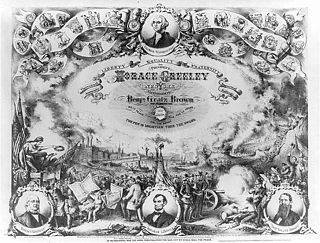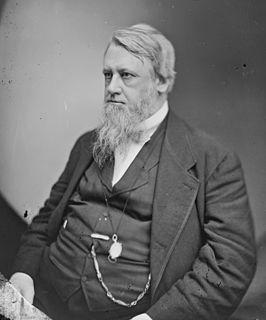Related Research Articles

The 1872 United States presidential election was the 22nd quadrennial presidential election, held on Tuesday, November 5, 1872. Despite a split in the Republican Party, incumbent President Ulysses S. Grant defeated Democratic-endorsed Liberal Republican nominee Horace Greeley.

John Kent arrived in Newfoundland in 1820 and started working for his uncle, Patrick Morris, a successful businessman and entrepreneur.

The Carlist Wars, a series of civil wars, took place in Spain during the 19th century. The contenders fought over claims to the throne, although some political differences also existed. Several times during the period from 1833 to 1876 the Carlists — followers of Don Carlos (1788-1855), an infante, and of his descendants — rallied to the cry of "God, Country, and King" and fought for the cause of Spanish tradition against liberalism, and later the republicanism, of the Spanish governments of the day. The Carlist Wars had a strong regional component, given that the new order called into question region–specific law arrangements and customs kept for centuries.

The 1872 Canadian federal election was held from July 20 to October 12, 1872, to elect members of the House of Commons of Canada of the 2nd Parliament of Canada. Prime Minister Sir John A. Macdonald's Conservative Party remained in power, defeating the Liberals. However, the Liberals increased their parliamentary representation considerably, while the Conservative seat count remained static, giving them only six more seats than the Liberals. The election produced the country's first minority government. The support of two independent Conservative MPs functionally gave Macdonald an extremely slim majority that allowed it to survive for two years, until it fell due to scandal.

Benjamin Gratz Brown was an American politician. He was a U.S. Senator, the 20th Governor of Missouri, and the Liberal Republican and Democratic Party vice presidential candidate in the presidential election of 1872.

The Liberal Republican Party was an American political party that was organized in May 1872 to oppose the reelection of President Ulysses S. Grant and his Radical Republican supporters in the presidential election of 1872. The party emerged in Missouri under the leadership of Senator Carl Schurz and soon attracted other opponents of Grant. The party sought civil service reform and opposed Grant's Reconstruction policies, particularly the Enforcement Acts which destroyed the Ku Klux Klan. It lost in a landslide and disappeared from the national stage after the 1872 election.

The 1872 and 1873 United States House of Representatives elections, coincided with the re-election of U.S. President Ulysses S. Grant.

The 1872 and 1873 United States Senate elections were elections which had the Republican Party, while still retaining a commanding majority, lose two seats in the United States Senate. By the beginning of the Congress, however, they'd lost three more: two as defections to the Liberal Republican Party, and one a resignation of Henry Wilson to become U.S. Vice President. These elections also coincided with President Ulysses S. Grant's easy re-election.
The 1872 Tiverton by-election was fought on 4 November 1872. The byelection was fought due to the Resignation of the incumbent MP of the Liberal Party, George Denman. It was won by the Liberal candidate William Massey.
The 1872 Flint Boroughs by-election was fought on 16 October 1872. The byelection was fought due to the incumbent Liberal MP, Sir John Hanmer, being elevated to the peerage. It was won by the Liberal candidate Sir Robert Cunliffe, who was unopposed.
The 1872 Pontefract by-election was fought on 15 August 1872. The ministerial by-election was fought due to the incumbent Liberal MP, Hugh Childers, becoming Chancellor of the Duchy of Lancaster and Paymaster General. It was retained by Childers.
The 1872 Aberdeen by-election was fought on 29 June 1872. The election occurred as a result of the death of the incumbent Liberal MP, William Henry Sykes. It was won by the "Moderate Liberal" candidate John Farley Leith against the official Liberal candidate James William Barclay, whose reputation as a Radical led to a split in the local party
The 1872 Bedfordshire by-election was fought on 27 June 1872. The byelection was fought due to the Succession to a peerage of the incumbent MP of the Liberal Party, Francis Russell. It was won by the Liberal candidate Francis Bassett.
The 1872 Oldham by-election was fought on 5 June 1872. The byelection was fought due to the death of the incumbent MP of the Liberal Party, John Platt. It was won by the Conservative candidate John Morgan Cobbett.
The 1872 Wexford Borough by-election was fought on 26 April 1872[20 3]. The election was fought due to the resignation of the incumbent MP of the Liberal Party, Richard Joseph Devereux. It was won by the Home Rule candidate William Archer Redmond.
The 1872 Flintshire by-election was fought on 2 March 1872. The byelection was fought due to the incumbent MP of the Liberal Party, Lord Richard Grosvenor, becoming Vice-Chamberlain of the Household. It was won by the Liberal candidate Lord Richard Grosvenor, who was unopposed.
The 1872 Wick Burghs by-election was fought on 28 February 1872. The byelection was fought due to the Resignation of the incumbent MP of the Liberal Party, George Loch. It was won by the Liberal candidate John Pender.
The 1872 North Nottinghamshire by-election was fought on 26 February 1872. The byelection was fought due to the incumbent Liberal MP, Evelyn Denison, becoming a peer. It was won by the Conservative candidate George Monckton-Arundell.

The 1872 United States elections were held on November 5, electing the members of the 43rd United States Congress. The election took place during the Third Party System. The election took place during the Reconstruction Era, and many Southerners were barred from voting. Despite a split in the party, the Republicans retained control of the presidency and both houses of Congress.

The 1872 United States presidential election in Iowa took place on November 5, 1872. All contemporary 37 states were part of the 1872 United States presidential election. The state voters chose 11 electors to the Electoral College, which selected the president and vice president.
References
This article needs additional citations for verification .(August 2014) |